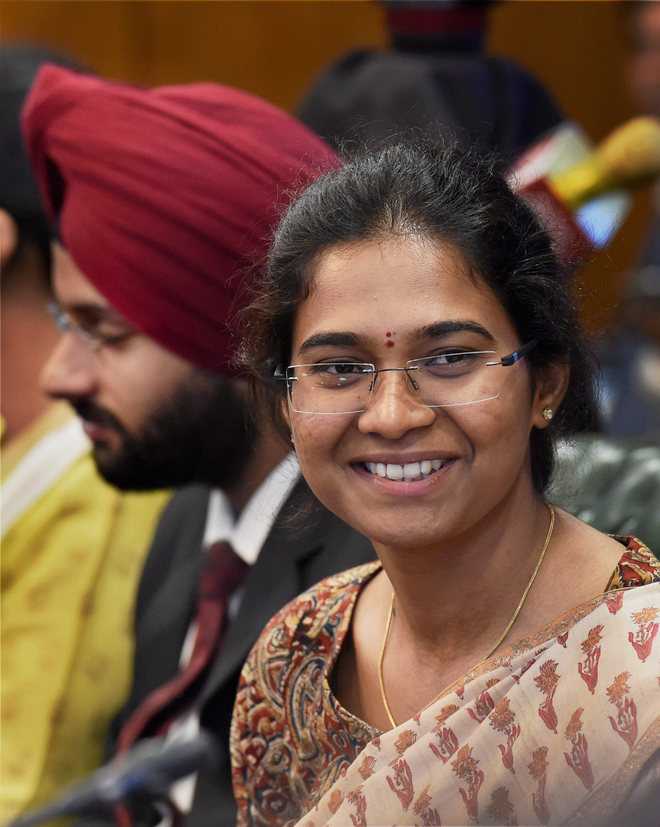A Story of Perseverance, Grit, and Service
In the long and illustrious list of UPSC toppers, few names shine as brightly as Nandini K R IAS, who secured All India Rank 1 in UPSC Civil Services Examination 2016. Her journey from a small village in Karnataka to India’s top bureaucratic rank is an inspiring tale of resilience, purpose, and disciplined effort. Nandini’s story continues to ignite hope in the hearts of aspirants—especially young women from rural India—who dare to dream big despite humble beginnings.
Humble Beginnings in Rural Karnataka
Born on September 15, 1990, in Kembodi village, nestled in Kolar district of Karnataka, Nandini grew up in a modest household. Her father, a government school teacher, and her mother, a homemaker, imbued in her a strong sense of discipline and value for education.
From an early age, Nandini showed academic promise. She completed her primary and secondary education in government-run Kannada medium schools—breaking the misconception that success in UPSC comes only from English-medium backgrounds or elite schools.
Her early academic excellence was fueled by supportive parents and dedicated teachers, who nurtured her growing curiosity and problem-solving mindset. These traits would later define her preparation style and success strategy.
Engineering and Career Before UPSC
Nandini went on to pursue Civil Engineering at the reputed M.S. Ramaiah Institute of Technology, Bangalore. She graduated with distinction, but even as she completed her engineering degree, she felt a growing inclination toward serving people directly through policymaking and governance.
After graduation, she joined the Karnataka Public Works Department (PWD) as an Assistant Engineer. Working on infrastructure projects and interacting with local citizens brought her face-to-face with systemic gaps and social challenges.
“Engineering helped me understand systems, but administration would allow me to transform them.”
This realization steered her toward India’s most prestigious exam—the UPSC Civil Services Examination.
UPSC Journey: Failures That Forged Her
Nandini’s journey to the top was far from linear:
- 2013 (1st attempt): Did not clear Prelims.
- 2014 (2nd attempt): Secured AIR 849, selected into the Indian Revenue Service (IRS).
- 2015 (3rd attempt): Missed the final list.
- 2016 (4th attempt): Topped the exam with AIR 1.
While undergoing training at the National Academy of Customs, Excise and Narcotics (NACEN) in Faridabad, she continued preparing for the IAS with an undying determination.
Preparation Strategy and Optional Subject (Kannada Literature)
Why Kannada Literature?
Despite her engineering background, Nandini chose Kannada Literature as her optional subject—proving that success lies in passion and comfort, not conventional choices.
- She read Kannada classics, analyzed poetic and philosophical texts, and practiced structuring literary answers with sociopolitical relevance.
- Resources were limited, so she built her notes from scratch and consulted professors and scholars for clarity.
- Her writing in Kannada retained a natural flow, helping her score exceptionally high in the optional papers.
Study Strategy
Nandini followed a disciplined yet flexible routine, adjusting her study hours based on job commitments and personal energy levels:
- 6–8 hours daily during weekdays (while training)
- 10+ hours on weekends
- Made short notes and flashcards for revision
- Solved previous years’ papers religiously
- Took regular mock tests for self-evaluation
Overcoming Mental Blocks
What separated Nandini from others was her emotional resilience. After failing twice, many candidates would have given up or settled into service. But she believed in her dream.
She overcame setbacks by:
- Talking regularly to her family for encouragement
- Practicing yoga and meditation
- Reading motivational books and topper interviews
- Visualizing herself as an IAS officer to stay focused
“Failures taught me to trust the process and stay grounded.”
UPSC Interview Experience
Her UPSC interview was a mix of DAF-based questions and situational analysis. Some key topics included:
- Gender parity in public services
- Role of civil engineers in disaster management
- Administrative reforms in Karnataka
- Use of Kannada in local governance
Nandini impressed the panel with her clarity, humility, and people-first mindset, scoring 193 marks in the interview—one of the highest that year.
Final UPSC Score
| Component | Marks |
|---|---|
| Written Total (Mains) | 927 /1750 |
| Interview (Personality Test) | 193 / 275 |
| Final Score | 1120 /2025 |
Beyond UPSC: Her Vision as an IAS Officer
Nandini is passionate about:
- Women’s education and empowerment in rural areas
- Transparent local governance through tech and community participation
- Inclusive development with special focus on tribal and backward regions
- Ensuring dignity of service delivery for the poorest citizens
She believes that governance must move from authority-centric to citizen-centric.
“An IAS officer must be the bridge between policies and people—not just a file mover.”
Women in Civil Services: Her Thoughts
As a woman from a small village, Nandini is an advocate for more women in leadership roles.
She has spoken at numerous events, encouraging young girls to take up civil services:
- Break stereotypes
- Speak up in male-dominated spaces
- Use education as the greatest equalizer
She hopes her journey will inspire thousands of girls from small towns who see themselves as future leaders.
Words of Advice to UPSC Aspirants
- Stick to limited resources, revise often
- Never compare your pace with others
- Failing once or twice doesn’t define your potential
- Choose an optional subject you truly enjoy
- Stay humble, consistent, and focused on service, not just success
Final Thoughts
Nandini K R IAS is more than a UPSC topper. She’s a role model, a trailblazer, and a symbol of hope for India’s aspiring youth—especially from underserved geographies and linguistic backgrounds.
Her story proves that:
“Greatness does not require privilege. It requires purpose, persistence, and the courage to keep going.”
From a Kannada-medium school to the top of the UPSC merit list, Nandini’s story will remain a testament to India’s democratic dream—where every child, no matter where they’re born, can rise to lead the nation.


